#climate alarmists
Explore tagged Tumblr posts
Text
Those believing that climate change is the greatest danger to the world, have said they're intent on altering our traveling in the future to reduce people's carbon footprint. Climate alarmists believe it's necessary to reduce America's standard of living by over 85 percent. They want to force everyone to have personal carbon allowances. If adopted, carbon passports will restrict how often we're permitted to travel. This video looks primarily at tourism and airline travel. The carbon emission alarmists want these restrictions by at least 2040!
#climate change#travel to be reduced#airline travel to be reduced#altered travel#climate alarmists#carbon allowances#carbon footprint#reduced travel to fight climate change#Intrepid Travel#personal carbon allowances#carbon passports#curbing emissions#carbon reductions by 2040#decarburizing travel#reduced standards of living#some resorts may vanish#rising temperatures
0 notes
Text
also from a purely geopolitical point world war 3 may start today im not trying to be a pessimist but the only reason why America is pushing for a “humanitarian pause” (lol but not in a haha way) all of a sudden is because, among other actors, the hezbollah is hitting israel hard and its leader Nasrallah is going to give a speech today which is making America-israel shake and quake in their boots. idk about that “all the marching and protesting is working” take. it might be a balm to the heart but personally I don’t think that’s the reason why there’s an urgent effort for Israels colonial terrorism to calm down amid a new 14 billion war crime aid package approved to be given to the Zionist entity by the U.S. House of Representatives yesterday. like that’s the only math that clicks to me. Israel is now fighting on several fronts and it has been a regional battle for several days now
#sba7atullah….#like I don’t want to sound like an alarmist but all the elements are here#I can try to come up with a timeline and different actors at play but#I have to go to work. in this climate of genocide and war crimes
24 notes
·
View notes
Text
okayokayokayokayokay
SO
UK PEOPLE: The new EAS phone alarm is not a Bad Thing!!!!
I keep seeing many articles abt how to turn it off and how people don't want it and stuff but the fact we have a phone EAS is a GOOD THING!
Warnings Save Lives!
I scrolled past this headline this morning:

You shouldn't want to do this. The government isn't (for once) being stupid. We need eas now because climate change!
The wildfires in The Heatwave? So many interviews on the news from people who lost everything said that the first they saw the fire was the bottom of their gardens because the didn't know about it. More areas of the UK are and will be prone to flash flooding. Storm systems are getting way way worse, and because the jet streams getting wigglier, can get "stuck" bettween two throughs and therefore the storm lasts waaay longer. Who knows what else climate change will do to the UK but for the sake of common sense Do Not Turn EAS Off. Please
I get it. Unexpected Loud Noise Scary. I have Audio Processing Disorder so I really do understand. Don't wanna be surprised by an EAS warning?
Pay attention to the weather! Even if it's just following the Met Office on Twitter (yuck). Tapping on a weather warning on the met office website and scrolling down to see exactly what's expected.
Loud Noise Scary but even scarier is the prospect of people being killed by a severe weather event that they could have saved themselves from if they knew it was happening.
Don't turn off your eas
#Emergency alert system#UK eas#climate change#ramble#sorry for ramble but i feel very impassioned abt this#like before The Heatwave and the govmt did no public education of how to slow and prevent wildfire#and I asked my parents to move all the dead leaves/ect to the back of the garden and for their neighbours to do the same and noone did and#then there were the fires in london on the news#im not being alarmist or doomsaying#we just need to be as prepared as we can for the fucked up climate#sorry for askin but I would really like as many people to see this as possible im so tired of convincing people that we need eas now#who knows who else might turn off the thing thay could save their life
16 notes
·
View notes
Text
The Boy Who Cried Wolf…
Who is still crying wolf…
With MILLIONS of soft-brained people still believing him.
1967: Dire Famine Forecast By 1975
1969: Everyone Will Disappear In a Cloud Of Blue Steam By 1989 (1969)
1970: Ice Age By 2000
1970: America Subject to Water Rationing By 1974 and Food Rationing By 1980
1971: New Ice Age Coming By 2020 or 2030
1972: New Ice Age By 2070
1974: Space Satellites Show New Ice Age Coming Fast
1974: Another Ice Age?
1974: Ozone Depletion a ‘Great Peril to Life
1976: Scientific Consensus Planet Cooling, Famines imminent
1980: Acid Rain Kills Life In Lakes
1978: No End in Sight to 30-Year Cooling Trend
1988: Regional Droughts (that never happened) in 1990s
1988: Temperatures in DC Will Hit Record Highs
1988: Maldive Islands will Be Underwater by 2018 (they’re not)
1989: Rising Sea Levels will Obliterate Nations if Nothing Done by 2000
1989: New York City’s West Side Highway Underwater by 2019 (it’s not)
2000: Children Won’t Know what Snow Is
2002: Famine In 10 Years If We Don’t Give Up Eating Fish, Meat, and Dairy
2004: Britain will Be Siberia by 2024
2008: Arctic will Be Ice Free by 2018
2008: Climate Genius Al Gore Predicts Ice-Free Arctic by 2013
2009: Climate Genius Prince Charles Says we Have 96 Months to Save World
2009: UK Prime Minister Says 50 Days to ‘Save The Planet From Catastrophe’
2009: Climate Genius Al Gore Moves 2013 Prediction of Ice-Free Arctic to 2014
2013: Arctic Ice-Free by 2015
2014: Only 500 Days Before ‘Climate Chaos’
1968: Overpopulation Will Spread Worldwide
1970: World Will Use Up All its Natural Resources
1966: Oil Gone in Ten Years
1972: Oil Depleted in 20 Years
1977: Department of Energy Says Oil will Peak in 90s
1980: Peak Oil In 2000
1996: Peak Oil in 2020
2002: Peak Oil in 2010
2006: Super Hurricanes!
2005 : Manhattan Underwater by 2015
1970: Urban Citizens Will Require Gas Masks by 1985
1970: Nitrogen buildup Will Make All Land Unusable
1970: Decaying Pollution Will Kill all the Fish
1970s: Killer Bees!
UPDATE:
42. 1975: The Cooling World and a Drastic Decline in Food Production
43. 1969: Worldwide Plague, Overwhelming Pollution, Ecological Catastrophe, Virtual Collapse of UK by End of 20th Century
44. 1972: Pending Depletion and Shortages of Gold, Tin, Oil, Natural Gas, Copper, Aluminum
45. 1970: Oceans Dead in a Decade, US Water Rationing by 1974, Food Rationing by 1980
46. 1988: World’s Leading Climate Expert Predicts Lower Manhattan Underwater by 2018
47. 2005: Fifty Million Climate Refugees by the Year 2020
48. 2000: Snowfalls Are Now a Thing of the Past
49.1989: UN Warns That Entire Nations Wiped Off the Face of the Earth by 2000 From Global Warming
50. 2011: Washington Post Predicted Cherry Blossoms Blooming in Winter because of global warming
2 notes
·
View notes
Text
CLIMATE CHANGE
MISINFORMATION....GARBAGE IN GARBAGE OUT [G.I.G.O.] The "record" HIGH temperatures are just that......records have ONLY been kept for LESS than 500 years. OUT of HOW LONG? Donnachadh McCarthy Climate Media Coalition is an IDIOT.
I DO believe there is such a thing as human induced climate change. BUT the garbage that these people carry on with just bc we record some hot temperatures is RIDICULOUS. AND they DO fiddle the data....it is NEVER consistent. To be useful, it MUST be taken from the same spot EVERY time. Taking land, air, sea, urban, rural temperatures is MISLEADING, UNHELPFUL, LYING. I support action to slow climate change but I will NOT support LYING to people, just to win support. This is gaslighting, pure and simple.
Watch "The Misinformation Is Coming From Oil Companies” Argues Donnachadh McCarthy On Climate Change" on YouTube
https://youtu.be/OWpl8nU8gMk?si=7WbcUDTh-pIqVJAx
2 notes
·
View notes
Text
hey uh so I haven't seen anyone talking about this here yet, but
the amazon river, like the biggest river in the fucking world, in the middle of the amazon fucking rainforest, is currently going through its worst drought since the records began 121 years ago
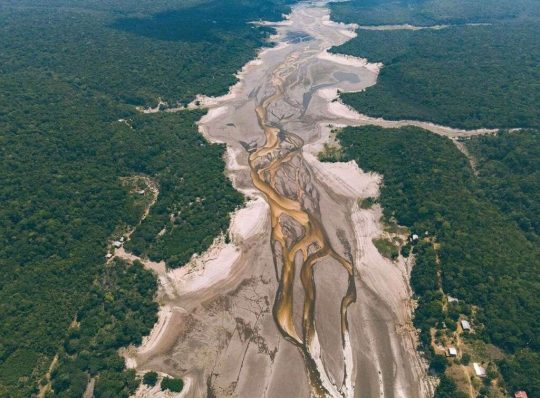
picture from Folha PE
there's a lot going on but I haven't seen much international buzz around this like there was when the forest was on fire (maybe because it's harder to shift the narrative to blame brazil exclusively as if the rest of the world didn't have fault in this) so I wanted to bring this to tumblr's attention
I don't know too many details as I live in the other side of the country and we are suffering from the exact opposite (at least three cyclones this year, honestly have stopped counting - it's unusual for us to get hit by even one - floods, landslides, we have a death toll, people are losing everything to the water), but like, I as a brazilian have literally never seen pictures of the river like this before. every single city in the amazonas state is in a state of emergency as of november 1st.
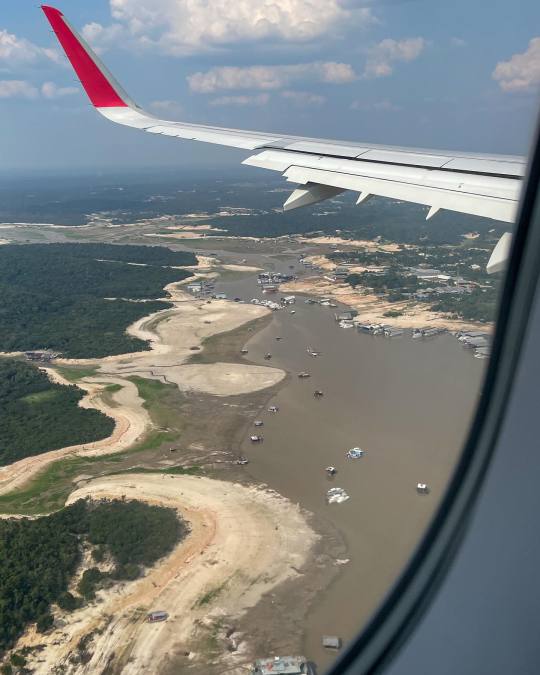
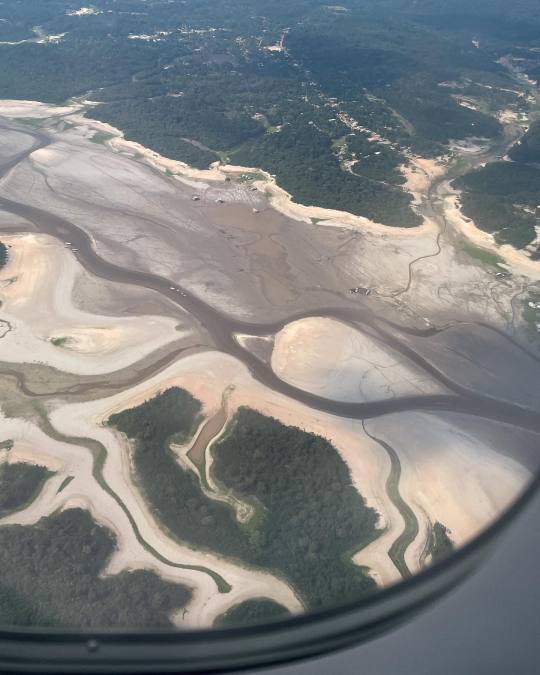
pictures by Adriano Liziero (ig: geopanoramas)
we are used to seeing images of rio negro and solimões, the two main amazon river affluents, in all their grandiose and beauty and seeing these pictures is really fucking chilling. some of our news outlets are saying the solimões has turned to a sand desert... can you imagine this watery sight turning into a desert in the span of a year?
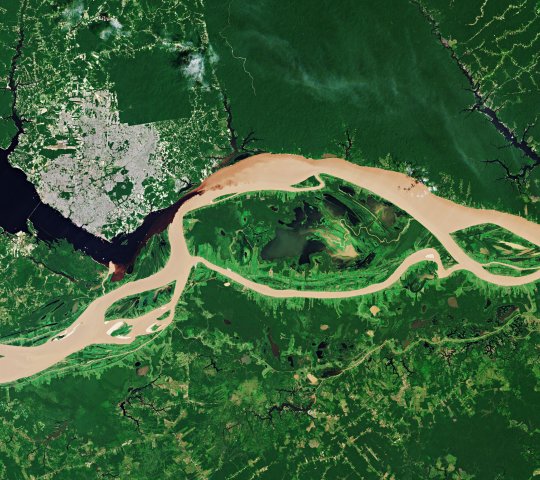
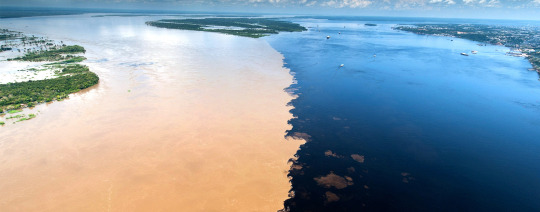
while down south we are seeing amounts of rain and hailstorms the likes of which our infrastructure is simply not built to deal with, up north people who have built everything around the river are at a loss of what to do.
the houses there that are built to float are just on the ground, people who depend on fishing for a living have to walk kilometers to find any fish that are still alive at all, the biodiversity there is at risk, and on an economic level it's hard to grasp how people from the northern states are getting by at all - the main means of transport for ANYTHING in that region is via the river water. this will impact the region for months to come. it doesnt make a lot of sense to build a lot of roads bc it's just better to use the waterway system, everything is built around or floats on the river after all. and like, the water level is so incomprehensibly low the boats are just STUCK. people are having a hard time getting from one place to another - keep in mind the widest parts of the river are over 10 km apart!!
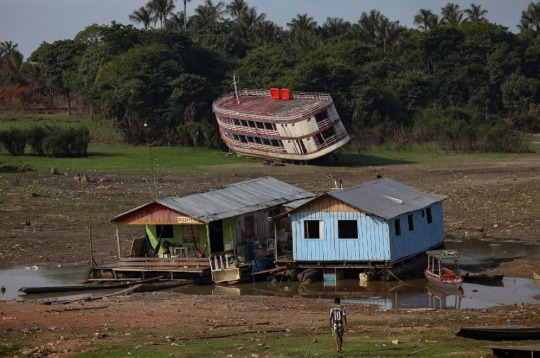
this shit is really serious and i am trying not to think about it because we have a different kind of problem to worry about down south but it's really terrifying when I stop to think about it. you already know the climate crisis is real and the effects are beyond preventable now (we're past global warming, get used to calling it "global boiling"). we'll be switching strategies to damage control from now on and like, this is what it's come to.
I don't like to be alarmist but it's hard not to be alarmed. I'm sorry that I can't end this post with very clear intructions on how people overseas can help, there really isn't much to do except hope the water level rises soon, maybe pray if you believe in something. in that regard we just have to keep pressing for change at a global level; local conditions only would not, COULD NOT be causing this - the amazon river is a CONTINENTAL body of water, it spans across multiple countries. so my advice is spread the word, let your representatives know that you're worried and you want change towards sustainability, degrowth and reduced carbon emissions, support your local NGOs, maybe join a cause, I don't know? I recommend reading on ecological and feminist economics though
however, I know you can help the affected riverine families by donating to organizations dedicated to helping the region. keep in mind a single US dollar, pound or euro is worth over 5x more in our currency so anything you donate at all will certainly help those affected.
FAS - Sustainable Amazon Fundation
Idesam - Sustainable Developent and Preservation Institute of Amazonas
Greenpeace Brasil - I know Greenpeace isn't the best but they're one of the few options I can think of that have a bridge to the international world and they are helping directly
There are a lot of other smaller/local NGOs but I'm not sure how you could donate to them from overseas, I'll leave some of them here anyway:
Projeto Gari
Caritás Brasileira
If you know any other organizations please link them, I'll be sure to reblog though my reach isn't a lot
thank you so much for reading this to the end, don't feel obligated to share but please do if you can! even if you just read up to here it means a lot to me that someone out there knows
also as an afterthought, I wanted to expand on why I think this hasn't made big news yet: because unlike the case of the 2020 forest fires, other countries have to hold themselves accountable when looking at this situation. while in 2020 it was easier to pretend the fires were all our fault and people were talking about taking the amazon away from us like they wouldn't do much worse. global superpowers have no more forests to speak of so I guess they've been eyeing what latin america still has. so like this bit of the post is just to say if you're thinking of saying anything of the sort, maybe think of what your own country has done to contribute to this instead of blaming brazil exclusively and saying the amazon should be protected by force or whatever
#solarpunk#sustainability#environmentalism#climate change#climate crisis#global warming#amazon rainforest#amazon river#geography#brazil#degrowth#punk#global boiling#ecopunk#anti capitalism#climate action#climate activism#the world does not die on my watch#i saw someone use that tag and uh i like it we should make it a thing#long post#:/ sorry i know no one likes lengthy bad news posts on their dashes but i've been thinking about this quite a bit#and i don't really know what to do to help bc i don't have money to donate and i am 10 thousand km away#i think i could be doing more to help but i am already trying my best#again dont feel obligated to share or read this but it would be nice and i would love you forever#have removed lbv from the post
7K notes
·
View notes
Text
SLAVES: 40,000 child slaves in Congo are forced to work in cobalt mines so we can drive electric cars.
In Alberta, Canada, there are tens of thousands of men who couldn't afford a post secondary education but were able to lift themselves and their families out of certain poverty through back breaking work in oil fields. They were able to buy homes and cars and college educations for their children.
The climate alarmists want that to end. They want the uneducated to stay at the bottom where they belong.
They're comfortable with cobalt mines in the Congo where women and children work as slaves in order to produce the minerals required for electric vehicles because this is the natural order of things in their minds.
It isn't about saving the planet. It's about power and control. They want the bottom to stay at the bottom because truly free markets and uneducated peasants who find success within them are a threat to the power and control they need.
#the great awakening#wef#world economic forum#capitalism#cobalt mines#republic of congo#the new world order
989 notes
·
View notes
Note
A heat island is just that. An artificial indication of ambient air temperature. Granted people may feel hotter than the airport temperature because of concrete etc but that temp is not a valid data point to infer global warming. Climate is not a day of data or even a year of data. Hot spells and cold snaps are quite the norm. Weather and climate both by definition and observation change often and sometimes radically. This has happen for thousands and millions even billions of years. The paltry addition of human industry is not a threat to a world climate system most prominently controlled and changed by our relative distance, inclination, and orbit of the earth in relation to the sun. That is the real science. Google Milankovitch sun cycles.
hi, I think the person who said it wasn't actually 52ºC is right. the highest temperature registered in bilbo was about 41º i think, those street thermometers aren't accurate and can show temperatures 10º higher than the actual one
https://www.xataka.com/magnet/termometros-calle-instrumento-desinformacion-publica-hora-solucionarlo
Kaixo anon!
They didn't say it wasn't actually 52°, they said it was a lie. Call me picky, but a lie needs an intention to spread information that is false, ie the place is not what it's said it is, the pic is fake or edited, etc. They didn't question the accuracy of the thermometer but said it - the pic, the post, whatever - was a lie.
That said, I already acknowledged that the official temperatures - the ones that show up when you Google them - are obtained by a thermometer inside a wooden box, shadowed, well above the ground, and with air flowing. And still that day it registered 43.7°C in Bilbo, not 41.
However, street thermometers may be closer to what we feel, to apparent temperature: they are sensitive to asphalt heat, lay in the urban heat island, and are under direct sunlight. Just like any passerby.
They can't be trusted sometimes for accurate air temperature? Correct.
They may be - sometimes - closer to how much heat we humans feel? Also correct.
The thermometer pictured was showing a higher temp than the official one measured at the airport? Probably
Was Bilbo city center hotter than the official thermometer wooden box that was already at almost 44°C? Also quite probably.
Does any of this make the temperature or anything else in the pic or post a lie?
#climate crisis#climate and environment#climate deniers#climate action#climate justice#climate alarmist#climate activism#climate science#global warming
15 notes
·
View notes
Text
Climate denial may be on the decline, but a phenomenon at least as injurious to the cause of climate protection has blossomed beside it: doomism, or the belief that there’s no way to halt the Earth’s ascendant temperatures. Burgeoning ranks of doomers throw up their hands, crying that it’s too late, too hard, too costly to save humanity from near-future extinction.
There are numerous strands of doomism. The followers of ecologist Guy McPherson, for example, gravitate to wild conspiracy theories that claim humanity won’t last another decade. Many young people, understandably overwhelmed by negative climate headlines and TikTok videos, are convinced that all engagement is for naught. Even the Guardian, which boasts superlative climate coverage, sometimes publishes alarmist articles and headlines that exaggerate grim climate projections.
This gloom-and-doomism robs people of the agency and incentive to participate in a solution to the climate crisis. As a writer on climate and energy, I am convinced that we have everything we require to go carbon neutral by 2050: the science, the technology, the policy proposals, and the money, as well as an international agreement in which nearly 200 countries have pledged to contain the crisis. We don’t need a miracle or exorbitantly expensive nuclear energy to stave off the worst. The Gordian knot before us is figuring out how to use the resources we already have in order to make that happen.
One particularly insidious form of doomism is exhibited in Kohei Saito’s Slow Down: The Degrowth Manifesto, originally published in 2020 and translated from Japanese into English this year. In his unlikely international bestseller, Saito, a Marxist philosopher, puts forth the familiar thesis that economic growth and decarbonization are inherently at odds. He goes further, though, and speculates that the climate crisis can only be curbed in a classless, commons-based society. Capitalism, he writes, seeks to “use all the world’s resources and labor power, opening new markets and never passing up even the slightest chance to make more money.”
Capitalism’s record is indeed damning. The United States and Europe are responsible for the lion’s share of the world’s emissions since the onset of the Industrial Revolution, yet the global south suffers most egregiously from climate breakdown. Today, the richest tenth of the world’s population—living overwhelmingly in the global north and China—is responsible for half of global emissions. If the super-rich alone cut their footprints down to the size of the average European, global emissions would fall by a third, Saito writes.
Saito’s self-stated goals aren’t that distinct from mine: a more egalitarian, sustainable, and just society. One doesn’t have to be an orthodox Marxist to find the gaping disparities in global income grotesque or to see the restructuring of the economy as a way to address both climate breakdown and social injustice. But his central argument—that climate justice can’t happen within a market economy of any kind—is flawed. In fact, it serves next to no purpose because more-radical-than-thou theories remove it from the nuts-and-bolts debate about the way forward.
We already possess a host of mechanisms and policies that can redistribute the burdens of climate breakdown and forge a path to climate neutrality. They include carbon pricing, wealth and global transaction taxes, debt cancellation, climate reparations, and disaster risk reduction, among others. Economies regulated by these policies are a distant cry from neoliberal capitalism—and some, particularly in Europe, have already chalked up marked accomplishments in reducing emissions.
Saito himself acknowledges that between 2000 and 2013, Britain’s GDP increased by 27 percent while emissions fell by 9 percent and that Germany and Denmark also logged decoupling. He writes off this trend as exclusively the upshot of economic stagnation following the Lehman Brothers bankruptcy in 2008. However, U.K. emissions have continued to fall, plummeting from 959 million to 582 million metric tons of carbon dioxide equivalent between 2007 and 2020. The secret to Britain’s success, which Saito doesn’t mention, was the creation of a booming wind power sector and trailblazing carbon pricing system that forced coal-fired plants out of the market practically overnight. Nor does Saito consider that from 1990 to 2022, the European Union reduced its emissions by 31 percent while its economy grew by 66 percent.
Climate protection has to make strides where it can, when it can, and experts acknowledge that it’s hard to change consumption patterns—let alone entire economic systems—rapidly. Progress means scaling back the most harmful types of consumption and energy production. It is possible to do this in stages, but it needs to be implemented much faster than the current plodding pace.
This is why Not the End of the World: How We Can Be the First Generation to Build a Sustainable Planet by Hannah Ritchie, a data scientist at the University of Oxford, is infinitely more pertinent to the public discourse on climate than Saito’s esoteric work. Ritchie’s book is a noble attempt to illustrate that environmental protection to date boasts impressive feats that can be built on, even as the world faces what she concedes is an epic battle to contain greenhouse gases.
Ritchie underscores two environmental afflictions that humankind solved through a mixture of science, smart policy, and international cooperation: acid rain and ozone depletion. I’m old enough to remember the mid-1980s, when factories and power plants spewed out sulfurous and nitric emissions and acid rain blighted forests from the northeastern United States to Eastern Europe. Acidic precipitation in the Adirondacks, my stomping grounds at the time, decimated pine forests and mountain lakes, leaving ghostly swaths of dead timber. Then, scientists pinpointed the industries responsible, and policymakers designed a cap-and-trade system that put a price on their emissions, which forced industry into action; for example, power plants had to fit scrubbers on their flue stacks. The harmful pollutants dropped by 80 percent by the end of the decade, and forests grew back.
The campaign to reverse the thinning of the ozone layer also bore fruit. An international team of scientists deduced that man-made chlorofluorocarbons (CFC) in fridges, freezers, air conditioners, and aerosol cans were to blame. Despite fierce industry pushback, more than 40 countries came together in Montreal in 1987 to introduce a staggered ban on CFCs. Since then, more countries joined the Montreal Protocol, and CFCs are now largely a relic of the past. As Ritchie points out, this was the first international pact of any kind to win the participation of every nation in the world.
While these cases instill inspiration, Ritchie’s assessment of our current crisis is a little too pat and can veer into the Panglossian. The climate crisis is many sizes larger in scope than the scourges of the 1980s, and its antidote—to Saito’s credit—entails revamping society and economy on a global scale, though not with the absolutist end goal of degrowth communism.
Ritchie doesn’t quite acknowledge that a thoroughgoing restructuring is necessary. Although she does not invoke the term, she is an acolyte of “green growth.” She maintains that tweaks to the world’s current economic system can improve the living standards of the world’s poorest, maintain the global north’s level of comfort, and achieve global net zero by 2050. “Economic growth is not incompatible with reducing our environmental impact,” she writes. For her, the big question is whether the world can decouple growth and emissions in time to stave off the darkest scenarios.
Ritchie approaches today’s environmental disasters—air pollution, deforestation, carbon-intensive food production, biodiversity loss, ocean plastics, and overfishing—as problems solvable in ways similar to the crises of the 1980s. Like CFCs and acid rain, so too can major pollutants such as black carbon and carbon monoxide be reined in. Ritchie writes that the “solution to air pollution … follows just one basic principle: stop burning stuff.” As she points out, smart policy has already enhanced air quality in cities such as Beijing (Warsaw, too, as a recent visit convinced me), and renewable energy is now the cheapest form of power globally. What we have to do, she argues, is roll renewables out en masse.
The devil is in making it happen. Ritchie admits that environmental reforms must be accelerated many times over, but she doesn’t address how to achieve this or how to counter growing pushback against green policies. Just consider the mass demonstrations across Europe in recent months as farmers have revolted against the very measures for which Ritchie (correctly) advocates, such as cutting subsidies to diesel gas, requiring crop rotation, eliminating toxic pesticides, and phasing down meat production. Already, the farmers’ vehemence has led the EU to dilute important legislation on agriculture, deforestation, and biodiversity.
Ritchie’s admonishes us to walk more, take public transit, and eat less beef. Undertaken individually, this won’t change anything. But she acknowledges that sound policy is key—chiefly, economic incentives to steer markets and consumer behavior. Getting the right parties into office, she writes, should be voters’ priority.
Yet the parties fully behind Ritchie’s agenda tend to be the Green parties, which are largely in Northern Europe and usually garner little more than 10 percent of the vote. Throughout Europe, environmentalism is badmouthed by center-right and far-right politicos, many of whom lead or participate in governments, as in Finland, Hungary, Italy, the Netherlands, Serbia, Slovakia, and Sweden. And while she argues that all major economies must adopt carbon pricing like the EU’s cap-and-trade system, she doesn’t address how to get the United States, the world’s second-largest emitter, to introduce this nationwide or even expand its two carbon markets currently operating regionally—one encompassing 12 states on the East Coast, the other in California.
History shows that the best way to make progress in the battle to rescue our planet is to work with what we have and build on it. The EU has a record of exceeding and revising its emissions reduction targets. In the 1990s, the bloc had the modest goal of sinking greenhouse gases to 8 percent below 1990 levels by 2008-12; by 2012, it had slashed them by an estimated 18 percent. More recently, the 2021 European Climate Law adjusted the bloc’s target for reducing net greenhouse gas emissions from 40 percent to at least 55 percent by 2030, and the European Commission is considering setting the 2040 target to 90 percent below 1990 levels.
This process can’t be exclusively top down. By far the best way for everyday citizens to counter climate doomism is to become active beyond individual lifestyle choices—whether that’s by bettering neighborhood recycling programs, investing in clean tech equities, or becoming involved in innovative clean energy projects.
Take, for example, “community energy,” which Saito considers briefly and Ritchie misses entirely. In the 1980s, Northern Europeans started to cobble together do-it-yourself cooperatives, in which citizens pooled money to set up renewable energy generation facilities. Many of the now more than 9,000 collectives across the EU are relatively small—the idea is to stay local and decentralized—but larger co-ops illustrate that this kind of enterprise can function at scale. For example, Belgium’s Ecopower, which forgoes profit and reinvests in new energy efficiency and renewables projects, provides 65,000 members with zero-carbon energy at a reduced price.
Grassroots groups and municipalities are now investing in nonprofit clean energy generation in the United States, particularly in California and Minnesota. This takes many forms, including solar fields; small wind parks; electricity grids; and rooftop photovoltaic arrays bolted to schools, parking lots, and other public buildings. Just as important as co-ownership—in contrast to mega-companies’ domination of the fossil fuel market—is democratic decision-making. These start-ups, usually undertaken by ordinary citizens, pry the means of generation out of the hands of the big utilities, which only grudgingly alter their business models.
Around the world, the transition is in progress—and ideally, could involve all of us. The armchair prophets of doom should either join in or, at the least, sit on the sidelines quietly. The last thing we need is more people sowing desperation and angst. They play straight into the court of the fossil fuel industry.
118 notes
·
View notes
Text
If I was you, Americans, I would take advantage that it is just the begging of government and start to save some media, like, fucking now
I am Brazilian, and if I was you, I would start to save in a pen drive or buy physical copies of things considered "leftist". Trump is crazy, a complete megalomaniac, and we already saw the first laws about trans people in the first day, so I will say it again:
Download or buy physical copies of things that can be considered "leftist".
It doesn't matter if it is a punk song, a movie explaining about poc history, your cute lgbt romance, or an informative books and articles in favor of lgbt people. Just download or buy it! It will variate from person to person. Some will prefer to save their favorite songs about revolution, others will prefer to have books about environment, some may like books like the Communism Manifest, others will save their cute gay movie, but just do it.
Things about the environment and climate change, history about poc people, history about women right and feminism, holocaust, books against nazis, about sex education, etc.
If you can do it, do it now. This man is a megalomaniac, and he looks that will do everything to erase us, and other important causes. So please, let's do it. There are so good contents, that you want to read someday, that will comfort you, teach things to you, but if he prohibits it, you and a lot of people who needs will not have. In the worst scenario, books, movies, series, and songs that helped us so much will disappear, may turn lost media to a good part of the population. They want to rewrite history, taking the true out of our hands.
I would also say to you use a VPN, and for folks in the whole world, remembers: USA is like an old brother, everything good or bad that it does, the world usually follows. I pray that it doesn't happy, but also in the worst case, the world will go to the same vibes as the USA.
Sorry if it sounded alarmist, but it is better safe than sorry, and I believe that it might happen. They banned Anne Frank and others books from school in Florida.
Sorry for the English. Repost it and share it, if you can, when more people see it, and save media. When people see it earlier, more media will be saved, and you won't lose things that you liked.
So many books are helping me when I am depressed, and I believe that I am sinning (in my case is open christians books in favor of lgbt people helps me a lot), and they might be banned, as many others books. I want people having a harder time have the songs to listen, the books to read, and the movies to watch, so please, save media.
Again, sorry if it sounded alarmist, but 'better safe than sorry', and this guy looks so crazy. I really don't know if any American started to think that it may happen.
Also, safe articles in favor of lgbt and others minorities!
#lgbtq#queer#queer community#trans#trans christian#transgender#gay#people of color#social issues#trump#fuck nazis#punk#elon musk#trump 2024#share#lesbian#feminism#hopecore#trans rights#women rights#repost it#books#banned books#jewish history#project 2025#environment and nature#save the environment#usa#bisexual#trans man
38 notes
·
View notes
Note
I don't keep up with a lot of climate change news because I truly think it's alarmist and silly, but I remember reading an article about how there used to be a sign at Glacier national park that said it's glaciers would be completely gone in 2020 because of climate change when lo and behold, 2020 came and the glaciers were... still there. and the signs were very quietly removed
That's what they do. They fear monger and make all this fuss and when nothing happens they just pretend they never said anything, move the deadline and act like that's what it always was.
68 notes
·
View notes
Text
@elonmusk
Exactly. Climate change risk is real, just much slower than alarmists claim.
The immense loss of homes in LA is primarily due to:
1. Nonsensical overregulation that prevented creating fire breaks and doing brush clearing.
2. Bad governance at the state and local level that resulted in a shortage of water.
@thatsKAIZEN
Climate change is real.
So is the inept far leftist response to it.
Hiring for and funding DEI while LAFD is underfunded.
Environmentalists prioritizing endangered fish over people.
A far leftist city is collapsing.
And if we don’t start getting real about why, more will.
15 notes
·
View notes
Text
0 notes
Text
"I don't live on the coast so I'm not that concerned about climate change"
Many cities in western NC have been wiped off the map. I don't mean the buildings are flooded, I mean the entire physical town is gone and the road that led there is also gone. The only thing I've ever seen that comes even close is the pictures of the Japanese tsunami.
Like I dont want to fear monger or be an alarmist, but Asheville is like 6 hours inland from the coast and IN THE MOUNTAINS like 2000 feet about sea level

Never ever ever would i think that Asheville would have hurricane damage before the coast did. NEVER


( Im not offering any solutions today or anything Im just venting 😞)
#hurricane helene#climate change#inane to see places ive been simply GONE#and knowing that ill never see them again#my thrilling life
22 notes
·
View notes
Text

@gamingavickreyauction moving this so op doesn't have to deal with tons of climate change discourse on their post
I don't really think there's any coherent model of the world where having fewer kids makes a positive change for the climate - emissions are driven primarily by patterns of production and consumption rather than by the sheer number of humans. A billion people who get all their energy from solar or nuclear power will generate fewer emissions than 100 million using coal.
Moreover there are pretty bad societal effects of having a collapsing population pyramid that East Asian societies are going to start seeing within our lifetimes. So I think treating not having kids as "the biggest thing you can do" is almost exactly backwards - having more young people is basically always prosocial.
Necessary caveats here: no one is ever obligated to have children, any policy that attempts to coerce childbirth or restrict access to contraception and abortion is extremely antisocial, etc etc
Climate change will probably have unpredictable effects - it's a massive disruption to the planet's ecosystem - but deciding preemptively that the world will no longer be worth living in 50 years from now seems alarmist and uninformed to say the least
74 notes
·
View notes
Text
By Vijay Jayaraj
When it comes to global energy policy, few narratives are as instructive — and as cautionary — as Europe’s.
Why?
Their ill-fated experiment with wind and solar energy.
The continent’s self-inflicted woes contain lessons that should be taken to heart by those formulating U.S. energy strategy for the incoming administration.
Europe’s Misplaced Trust in Wind and Solar
Europe’s embrace of weather-dependent power generation, particularly in Germany and the United Kingdom, was a profound miscalculation.
These nations embarked on an ambitious energy transformation, predicated on the assumption that wind and solar could replace traditional fossil fuels. The result has been a catastrophe, as predicted by many.
Germany, often celebrated as the champion of “renewable” energy, should be crowned king of incompetence.
The country’s heavy investment in wind and solar has not only failed to deliver promised reductions of carbon dioxide emissions — the bogeyman of climate alarmists — but also has destabilized its once robust industrial economy.
Germany’s manufacturing sector — historically, the economic powerhouse of Europe — has been brought to its knees, with energy costs rendering many industrial processes economically unviable.
Reporting on prices in the second week of December, Robert Bryce says that “Germany’s wholesale power market came close to $1,000 per megawatt-hour, the highest level in 18 years.”
The fundamental problem lies in the inherent unpredictability of renewable sources.
Wind power demonstrates acute vulnerabilities during critical periods.
Winter presents a perfect storm of challenges: Reduced wind generation coincides with peak energy demand, creating grid instability, and heightened risk of blackouts.
12 notes
·
View notes